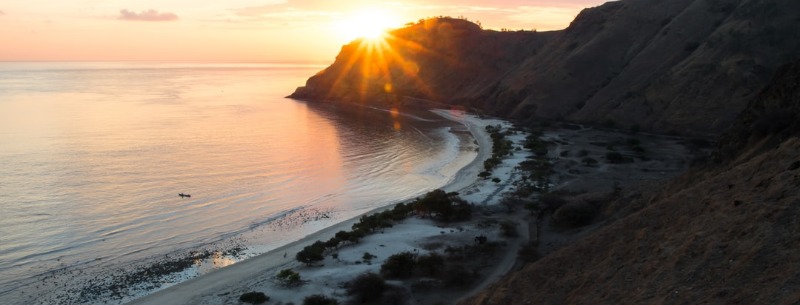Dili, capital city of East Timor
Amid the crowded refugee camps and burnt-old buildings in Dili lie charming neighborhoods where frangipani trees shed colorful flowers onto the streets, chickens and goats run free and dignified colonial buildings serve as a reminder of the past. The people are kind, the waterfront is serene, and a brief walk from any point in the city will take you to golden beaches.
Familiarize yourself with the history of East Timor, or Timor-Leste as it is called by the locals, at the Resistance Museum. Housed in an impressive new building, the museum chronicles the country’s 24-year long struggle for independence from Indonesia. Good timeline details the most important events in English, and the collection of gear used by the Falintil as they sought refuge in the hills is fascinating.
One of the most startling and heartbreaking events in the war occurred on November 12th, 1991, when Indonesian soldiers opened fire on more than 200 civilian mourners at the Santa Cruz Cemetery. Some participants in the peaceful memorial procession were killed on sight, while others were rounded up and taken away by the military. Two American journalists also died in the massacre, and British journalist Max Stahl filmed the whole bloody event. His documentary is shown regularly in Dili’s Xanana Gusmão Reading Room. The massacre became a turning point in the struggle for independence, and visitors to the cemetery can pay tribute to those who lost their lives for the freedom of East Timor.
Outdoor enthusiasts have longed flocked to the country to experience its pristine and untouched nature, and few world capitals offer as many opportunities for adventure as Dili. Diving is an enormously popular activity, and the waters off the coast of the city are rich in exotic marine life. Snorkelers and scuba divers can swim with schools of barracuda, huge pelagics, and many species of turtles and sharks in the city’s harbor and explore the unspoiled beauty of coral reefs not far from the shore.
The island getaway of Atauro lies just outside the city, but it feels like an entirely different world. The lush mountain interior gives way to uninterrupted beaches and untouched coral reefs, and its isolation ensures that visitors will not see many passersby on its extensive walking trails or while snorkeling in the crystalline waters. A few small villages spread across Atauro, but travelers should stock up on supplies in Dili and consider hiring a local guide in the capital before boating over to the island.
As the sun starts to set, join the faithful locals in their nightly pilgrimage to the massive statue of Jesus that tops the headlands to the east of the capital. You will find yourself surrounded by both sporty ex-pats and local fisherman as you make the trek past several representations of the stations of the cross on the way up the hill. When you reach the statue, look out across the bay to enjoy one of the most spectacular views of Dili against the setting sun. Finish the evening with a giant margarita on the beach, and don’t forget to look up; the stars are incredible above the city.
Dili Geographical Location
Dili is located on the northwestern coast of East Timor facing the Banda Sea.
Dili is the largest city in East Timor and has a population of 195,000.
Dili Language
The two official languages of East Timor are Portuguese and Tetum.
Dili Predominant Religion
- 98% Roman Catholic
- 2% Other
While Roman Catholicism is the most prominent religion, the government of East Timor reports that animist traditions are still practiced by most of the population in addition to Catholicism.
Dili Currency
The US Dollar is the official currency of East Timor.
Dili Climate
Dili is hot and humid throughout the year with a rainy season between December and March.
Dili Main Attractions
- Areia Branca
- Atauro Island
- Liquica
Other Attractions in Dili
- Cristo Rei
- Beaches
